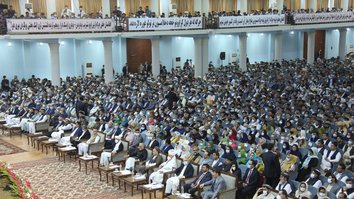KABUL -- Afghans across the country are awaiting the announcement of the start of negotiations after Afghan authorities said Friday (August 14) they had started to release 400 Taliban prisoners, the final hurdle in long-delayed peace talks between the two warring sides.
The Afghan government and the Taliban are set to meet within days of the prisoner release.
A group of 80 prisoners were released Thursday (August 13), National Security Council spokesman Javid Faisal said, tweeting that it would "speed up efforts for direct talks and a lasting, nationwide ceasefire".
The release of 400 militants received approval on August 9 by a loya jirga, whose members said they wanted to pave the way for talks to begin in Doha, Qatar, and a possible ceasefire.
But the decision has caused heartache for the families of those killed by the insurgents.
"If [the Taliban] can't bring peace and they attack again, thousands of people will be killed and their families will be tormented," said Bashir Naween, whose brother was killed in a 2017 truck bombing near the German embassy in Kabul, an attack involving one of the militants due to be released.
"But if real peace comes, we won't have any problems because... our big dream is peace," he told AFP.
'Peace will have consequences'
The prisoners include at least 44 insurgents of particular concern to the United States and other countries for their role in high-profile attacks, according to an official list seen by AFP.
Ghani August 13 warned that the hardened criminals were "likely to pose a danger both to us and to [America] and to the world".
"Until this issue, there was a consensus on the desirability of peace, but not on the cost of it," Ghani said in a video conference organised by a US think-tank.
"We have now paid the major installment on cost, and that means peace will have consequences," he added.
A prisoner swap formed part of a deal signed by the Taliban and the United States in February, which saw Washington agree to withdraw its troops from Afghanistan in return for various commitments from the insurgents including a pledge to hold peace talks with the Afghan government.
The loya jirga was called by Ghani after authorities initially refused to free the final 400 militants.
In a resolution, the jirga asked authorities to monitor the freed prisoners to ensure they did not return to the battlefield.

![Taliban prisoners walk out of Pul-e-Charkhi prison in Kabul on August 13. [Afghan National Security Council]](/cnmi_st/images/2020/08/14/25513-taliban_prisoners-585_329.jpg)







We should not wait for the peace. The United States is just throwing dust in the eyes of Afghans. What kind of peace is it as its process started many years ago, but we haven’t tried its taste or flavor yet. If America really has sympathy with the poor nation of Afghanistan, it must put pressure on Pakistan so that this country stops training and financing terrorists. The cause of Afghanistan’s devastation is that Pakistan finances and equips terrorists. If Pakistan does not do so, there will be peace in Afghanistan within a week.
Reply2 Comment
Both warring sides should use the opportunity provided for peace. After forty years, this is the first time as such an opportunity has been available to end the forty-year war of Afghanistan and ensure a lasting peace. We call on both sides to put aside their hatred, enmity and sit together and make a wise decision about the formation of an inclusive and national government for the future of the country. In the future government, all the groups or masses should be included so that no one should say that this is not a national government. The future government of the country should be both Islamic and national.
Reply2 Comment